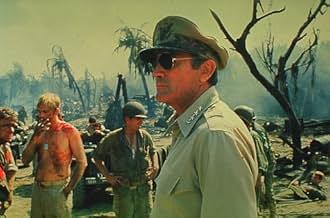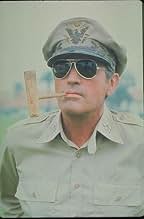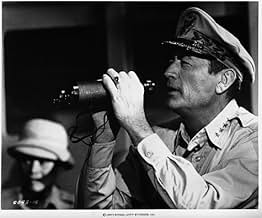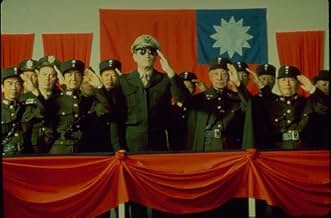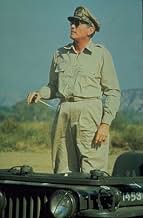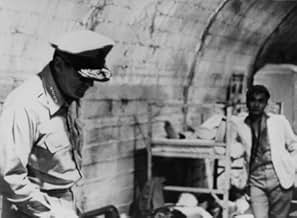AVALIAÇÃO DA IMDb
6,5/10
5,4 mil
SUA AVALIAÇÃO
Adicionar um enredo no seu idiomaBiopic of General Douglas MacArthur covering his war exploits during WW2 and the Korean War.Biopic of General Douglas MacArthur covering his war exploits during WW2 and the Korean War.Biopic of General Douglas MacArthur covering his war exploits during WW2 and the Korean War.
- Prêmios
- 2 indicações no total
Russell Johnson
- Admiral King
- (as Russell D. Johnson)
- Direção
- Roteiristas
- Elenco e equipe completos
- Produção, bilheteria e muito mais no IMDbPro
Enredo
Você sabia?
- CuriosidadesAt the start of filming, Gregory Peck disliked General Douglas MacArthur. After filming he changed his mind, understanding the challenges MacArthur had faced. He also stated he believed President Harry S. Truman was wrong to relieve MacArthur of his command in Korea in April 1951.
- Erros de gravaçãoIn the opening scene of the bombardment of the 1950 amphibious landing at Inchon, an air strike is depicted where clearly the silhouette of an F4 Phantom is shown, an aircraft that didn't enter service until 1960.
- Citações
President Sergio Osmena: You see, General, my people are going to laugh if I fell in deep water. I cannot swim!
General Douglas MacArthur: That's not so bad, Mr. President. Everyone's about to see that I can't walk on water.
- Versões alternativasThe UK DVD issue omits the sequence where MacArthur meets Emperor Hirohito, but instead, adds to the ending. The film now ends with MacArthur and his wife watch a TV transmission of the presidential inauguration of Eisenhower MacArthur's comment: "He will turn out fine. He was the best clerk that ever served under me"), followed by the end of MacArthur's farewell speech at West Point. The subsequent credits starts to roll slightly earlier than previously.
Avaliação em destaque
There isn't much argument that MacArthur was a good strategist and a brave man. And that's the picture you get of him in this movie. Besides a bit of vanity, only the slightest, the general seems to have no flaws. The dark side of this genius is missing.
Of course no movie, not even at 130 minutes, can capture all of a man's professional history, but the lacunae here are convenient ones. The upshot is that this is like one of those John Singer Sargent portraits of society women that made them look sexier and prettier than they probably were.
For instance, MacArthur remarks somewhere along the line that his casualties are fewer than anyone else's (or something like that) when in fact those figures have been contested. MacArthur's aching desire to invade China is turned into a kind of a joke, when he complains that he is only allowed to bomb the southern entrances to bridges across the Yalu River -- "In all my career, I've never learned how to bomb HALF A BRIDGE." Very amusing. But then his political views as a whole, which were somewhere to the right of Attila the Hun's, are skipped over. His run for president fizzled because not even the most rabid anti-communist power broker wanted a war with China, but this too is turned into a morbid joke, when MacArthur remarks to his wife about the newly elected Eisenhower -- "He'll make a great president. He was the best clerk I ever had." (Eisenhower's joke appears elsewhere -- "I spent seven years under MacArthur studying dramatics.") The most illustrative revelation of MacArthur's character isn't in the film. MacArthur recruited Weldon E. Rhoades as the personal pilot of his B-17 and the aviator became a loyal disciple and sometimes personal confidant. By Rhoades' own admission, "this meant that the general would talk for great lengths of time during which Rhoades was not expected to respond."
One last point that is glossed over. MacArthur is stuck on the island of Corregidor in the Philippines surrounded by Japanese but prepared to fight it out. He is ordered to return to Australia on PT boats. He objects strenuously but in the end obeys his orders and retreats. It's a dangerous voyage on small worn-out boats made of plywood. And for this he is awarded the medal of honor. The officers and men of that handful of boats made the same voyage -- round trip too -- and no medals of honor for them, although they were acting under the same conditions, following orders. (An aside: the bar is a little lower for high-ranking officers, which is why their dress uniforms seem to droop with decorations like some Latin American dictators'.)
But it's not a bad movie, as long as you're looking for a heroic picture of an undoubtedly heroic man. Gregory Peck exudes his usual sincerity and is a much more effective speaker than MacArthur himself who almost always sounded like a blowhard. And Peck had to do quite a good job to overcome that florid prose -- "Still, I listen with thirsty ear for the tocsin call," etc. ("Thirsty ear.") In a speech at West Point McArthur also misattribues a quote from Santayana to Plato ("only the dead have seen the end of war"), but that's carping.
The movie follows the same pattern as "Patton." Give us an admirable hero, one human enough to have a little fun poked at him. (Peck emerges from a shower draped in a couple of huge bath towels arranged like a toga, so that he resembles Caesar.) Surround him with devoted but sometimes puzzled subordinates who, when they are not courting his favor, are warning him that something he plans to do might be misinterpreted by the suits back in Washington. Just don't have him do anything seriously wrong.
Production values are good. This is an expensive picture. Supporting players more or less blend into one another -- there's only room for one Caesar in this movie.
Some things are left unexplained, unintentionally it would seem, since this is not the kind of movie that thrives on leaving anything up to the viewer. General Wainwright is left behind on Corregidor to surrender to the Japanese. Back in Australia, MacArthur fumes at such cowardice, Wainwright must be temporarily deranged. But when they meet again when Manila is liberated, MacArthur greets him like a long lost pal. What happened? And the big meeting between MacArthur and Truman that was supposed to iron out the differences between them? It's confusingly staged and scripted. Both sides seem to come away satisfied but, if that were the case, the satisfaction must have been based on some profound misunderstandings because afterward MacArthur and Truman both went merrily on their divergent ways.
I kind of enjoy watching it once in a while. The Irish Daniel O'Herlihy does a side-splitting impression of Franklin D. Roosevelt. And the action scenes are fairly well done. I do wish that the movie had been more honest with its subject. As it is, it's a flawed movie about a flawed but remarkable man.
Of course no movie, not even at 130 minutes, can capture all of a man's professional history, but the lacunae here are convenient ones. The upshot is that this is like one of those John Singer Sargent portraits of society women that made them look sexier and prettier than they probably were.
For instance, MacArthur remarks somewhere along the line that his casualties are fewer than anyone else's (or something like that) when in fact those figures have been contested. MacArthur's aching desire to invade China is turned into a kind of a joke, when he complains that he is only allowed to bomb the southern entrances to bridges across the Yalu River -- "In all my career, I've never learned how to bomb HALF A BRIDGE." Very amusing. But then his political views as a whole, which were somewhere to the right of Attila the Hun's, are skipped over. His run for president fizzled because not even the most rabid anti-communist power broker wanted a war with China, but this too is turned into a morbid joke, when MacArthur remarks to his wife about the newly elected Eisenhower -- "He'll make a great president. He was the best clerk I ever had." (Eisenhower's joke appears elsewhere -- "I spent seven years under MacArthur studying dramatics.") The most illustrative revelation of MacArthur's character isn't in the film. MacArthur recruited Weldon E. Rhoades as the personal pilot of his B-17 and the aviator became a loyal disciple and sometimes personal confidant. By Rhoades' own admission, "this meant that the general would talk for great lengths of time during which Rhoades was not expected to respond."
One last point that is glossed over. MacArthur is stuck on the island of Corregidor in the Philippines surrounded by Japanese but prepared to fight it out. He is ordered to return to Australia on PT boats. He objects strenuously but in the end obeys his orders and retreats. It's a dangerous voyage on small worn-out boats made of plywood. And for this he is awarded the medal of honor. The officers and men of that handful of boats made the same voyage -- round trip too -- and no medals of honor for them, although they were acting under the same conditions, following orders. (An aside: the bar is a little lower for high-ranking officers, which is why their dress uniforms seem to droop with decorations like some Latin American dictators'.)
But it's not a bad movie, as long as you're looking for a heroic picture of an undoubtedly heroic man. Gregory Peck exudes his usual sincerity and is a much more effective speaker than MacArthur himself who almost always sounded like a blowhard. And Peck had to do quite a good job to overcome that florid prose -- "Still, I listen with thirsty ear for the tocsin call," etc. ("Thirsty ear.") In a speech at West Point McArthur also misattribues a quote from Santayana to Plato ("only the dead have seen the end of war"), but that's carping.
The movie follows the same pattern as "Patton." Give us an admirable hero, one human enough to have a little fun poked at him. (Peck emerges from a shower draped in a couple of huge bath towels arranged like a toga, so that he resembles Caesar.) Surround him with devoted but sometimes puzzled subordinates who, when they are not courting his favor, are warning him that something he plans to do might be misinterpreted by the suits back in Washington. Just don't have him do anything seriously wrong.
Production values are good. This is an expensive picture. Supporting players more or less blend into one another -- there's only room for one Caesar in this movie.
Some things are left unexplained, unintentionally it would seem, since this is not the kind of movie that thrives on leaving anything up to the viewer. General Wainwright is left behind on Corregidor to surrender to the Japanese. Back in Australia, MacArthur fumes at such cowardice, Wainwright must be temporarily deranged. But when they meet again when Manila is liberated, MacArthur greets him like a long lost pal. What happened? And the big meeting between MacArthur and Truman that was supposed to iron out the differences between them? It's confusingly staged and scripted. Both sides seem to come away satisfied but, if that were the case, the satisfaction must have been based on some profound misunderstandings because afterward MacArthur and Truman both went merrily on their divergent ways.
I kind of enjoy watching it once in a while. The Irish Daniel O'Herlihy does a side-splitting impression of Franklin D. Roosevelt. And the action scenes are fairly well done. I do wish that the movie had been more honest with its subject. As it is, it's a flawed movie about a flawed but remarkable man.
- rmax304823
- 10 de nov. de 2003
- Link permanente
Principais escolhas
Faça login para avaliar e ver a lista de recomendações personalizadas
- How long is MacArthur?Fornecido pela Alexa
Detalhes
- Data de lançamento
- País de origem
- Idioma
- Também conhecido como
- MacArthur
- Locações de filme
- Navy Yard, Bremerton, Washington, EUA(scenes on USS Missouri)
- Empresa de produção
- Consulte mais créditos da empresa na IMDbPro
Bilheteria
- Orçamento
- US$ 9.000.000 (estimativa)
Contribua para esta página
Sugerir uma alteração ou adicionar conteúdo ausente

Principal brecha
By what name was MacArthur, O General Rebelde (1977) officially released in India in English?
Responda
